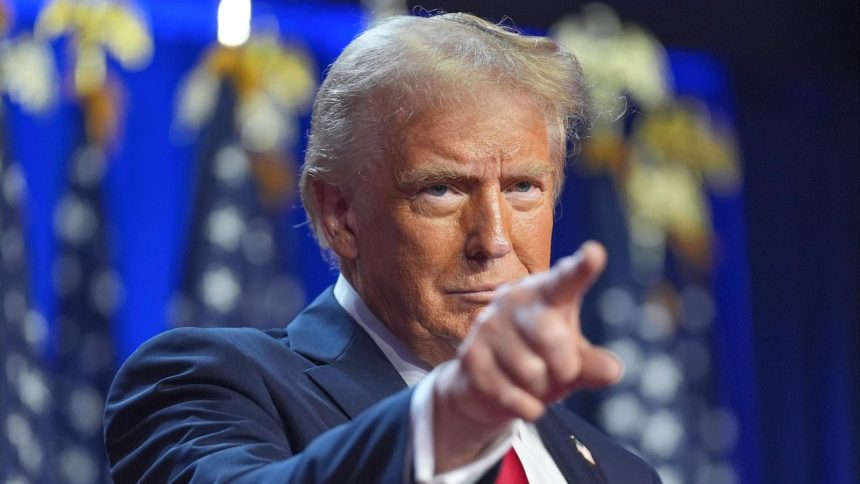President Donald Trump slapped tariffs and travel bans on Colombia on Sunday, after the South American country refused to allow two planes of deported migrants to land on its soil.
In a social media post, Trump said he has ordered an emergency 25% tariff on all Colombian goods coming into the US, which will be raised to 50% in one week. Oil, gold, coffee and flowers top the list of exports, according to Colombia’s tax authorities.
He has also called for a travel ban and immediate visa revocations on Colombian government officials “and all Allies and Supporters” as well as visa sanctions on party members, family members and supporters of the government of President Gustavo Petro.
“Petro’s denial of these flights has jeopardized the National Security and Public Safety of the United States,” Trump said.
Petro said earlier Sunday that he’d reject US flights carrying migrants unless they were treated with dignity and not as criminals. Brazil received 88 migrants on Friday, who were shackled and in handcuffs.

US Customs and Border Protection security agents guide a group of migrants to board a C-17 Globemaster III aircraft for a removal flight at Fort Bliss, Texas, on Jan. 23.Photographer: Sgt. 1st Class Nicholas J. De La/US Department of Defense
In a statement on Sunday, Colombia said it would offer the presidential plane to arrange the repatriation flights for migrants set to return to Colombia Sunday, as it considers the military planes Trump is using as degrading to the migrants.
While most South American nations now do more business with China, the US remains Colombia’s top trading partner.
Between January and November 2024, Colombian exports to the US reached $13 billion, a near 8% increase compared to the same period in 2023. Colombians in the US also also generate strong cultural ties and remittance flows.
Colombia is the US’s fourth-biggest source of foreign oil, topping both Saudi Arabia and Brazil, according to the Energy Information Administration. The latest data showed Colombia shipping more than 215,000 barrels of crude daily to US ports.
About a third, or 29%, of Colombian exports go to the US.
Trump also said in his post that he would enhance inspections from US Customs and Border Protection of all Colombian nationals and cargo on national security grounds. He added that under his executive authority, Treasury, banking and financial sanctions will be fully imposed.
BRAZIL-US-MIGRATION-DEPORTATION
The plane that brought Brazilians who were deported from US, sits at Eduardo Gomes International Airport in Manaus, Amazonas state, Brazil, on Jan. 25.Photographer: Michael Dantas/AFP/Getty Images
Trump delivered a fresh threat upon taking office to place tariffs on Canada, Mexico and China on Feb. 1, which he said would balance trade deals and collect revenue to offset his domestic legislative proposals. While on the campaign trail, he considered creating a universal baseline tariff as a way to incentivize manufacturing and business in the United States.
But Trump’s reaction to Petro’s rejection of some deported migrants shows how he sees tariffs as an economic weapon to be deployed against governments that may challenge his geopolitical goals. It sends a powerful message to the world, that not even old political allies are safe if they do not cooperate with his goals.
Colombia has historically been one of Washington’s biggest allies in Latin America and a major recipient of US aid and military assistance. Yet as one of Latin America’s leading leftist leaders, Petro was already on the wrong side of Trump. Petro has courted China and slammed Israel over the death toll among Palestinians in its war with Hamas.
“Petro’s response to Trump was foolish and it was a fight he won’t win,” Sergio Guzmán, an analyst at Colombia Risk Analysis said. “Social media posts have consequences, and it will be a difficult moment for Colombia as it will have real repercussions on us.

“It couldn’t come at a worst moment for the Colombian flower industry,” he said, given Valentine’s Day is approaching.
The two countries’ ties were already at risk after last week, when guerrillas from the Marxist ELN group went door to door with death lists in a bid to seize total control of Catatumbo, a mountainous cocaine-producing region near the Venezuelan border.
As a result, Colombia could potentially face decertification as a partner in the war on drugs, putting it in the same rogue category as Nicolás Maduro’s Venezuela — even if the effect would be more reputational than financial.
The White House has said that it has arrested 538 illegal immigrants and had begun using military aircrafts to remove them within the administration’s first 100 hours.
— With assistance from Joe Carroll, Walter Brandimarte, and Oscar Medina



